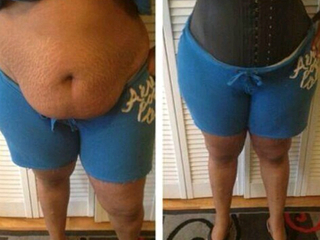How to Lose Water Weight
Water weight refers to the extra water that's stored all over your body — in your fingers, face, legs and even your toes; however, water weight is temporary and should not be confused with chronic, long-term water retention (which may be due to disease or medications and should be addressed by a doctor). You may notice the difference on the scale after a salty meal, a few days after overindulgence, if you're dehydrated or right before a menstrual cycle. [1] Hanging on to these few extra pounds can make you feel bloated, sluggish and a little uncomfortable — especially if your pants feel a bit snug. Whether you have a big event coming up, feel unusually bloated or just want to shift the scale down a few pounds, losing water weight is a temporary solution to looking and feeling better in a short amount of time. If you make a few simple changes to your diet and lifestyle you may be able to see your weight drop back down in addition to decreased bloating.
Steps
Method 1 Modifying Your Diet
-
1
Limit your sodium intake. This is one of the most important steps in reducing bloat because it has an immediate effect on the way that your kidneys control the water balance in your body.[2] Too much salt may cause the body to retain water leading to bloating and swelling.
Avoid processed foods. Most processed meats, prepackaged snacks, frozen meals, and canned foods are high in sodium. Stop salting your meals The American Heart Association recommends consuming less than 1500 mg of sodium each day, or about 1½ tsp (7 mL).[3] Salting your food makes it easy to go over this limit. Avoid no-sodium diets Your body requires small amounts of sodium to function.[4] -
2
Eat more potassium-rich foods. Potassium is an essential mineral in the diet that's responsible for fluid balance in the body. Low amounts of potassium (although rare) may cause unnecessary fluid retention.[5] Focusing on potassium rich foods may help your body release excess water.
Fruits: apricots, banana, cantaloupe, dates, kiwi, mango, oranges, papaya, avocado Vegetables: acorn squash, carrots, artichokes Legumes: dried beans, peas, lentils -
3
Eat adequate fiber daily. A low-fiber diet may cause constipation which can lead to bloating, abdominal distention and weight retention.[6] Women should consume 25 g fiber daily and men should consume 38 g of fiber daily.[7]
- Eating a variety of fruits and vegetables can help increase your fiber intake and reduce excess water weight by relieving bloating from constipation.[8]
-
4
Eat foods that contain probiotics. Some foods contain probiotics naturally and may help reduce gas, bloating or abdominal distention. These good bacteria help regulate your GI system and may prevent or decrease side effects common with constipation.[9]
- Keeping your GI system healthy and managing any constipation can help alleviate bloating, stomach cramps and abdominal distention.
- Foods that contain probiotics include: yogurt, kefir, miso, tempeh, kimchi, sauerkraut and pickles.
- If you dislike these foods you can also try taking a probiotic supplement daily.
-
5
Limit the amount carbs in your diet. A low-carbohydrate diet may help you lose excess water weight quicker than a low calorie diet alone. Limiting the amount of carbohydrate rich foods (both refined and 100% whole grains) you eat can help you drop a few extra pounds of water weight fairly fast.
- Limit these high-carb foods: bread, rice, pasta, crackers, tortillas, bagels, muffins, pastries, English muffins, quinoa, sweetened beverages and desserts. Both refined and complex carbs affect your body the same way.
- When you eat carbohydrates, your body uses some as immediate energy and transforms the rest into glycogen — the body's storage form of carbohydrate. As your body stores glycogen, it also brings water with it.[10] This can cause weight gain and fluid retention.
- When you limit the amount of carbohydrates you consume, your body relies more heavily upon the glycogen stores in the body. When the glycogen is used for energy, water is also released, causing a small decrease in your weight.[11]
-
6
Drink more water. You may be retaining water because you haven't been drinking enough of it in the first place. Mild dehydration causes your body to hold onto water since there isn't adequate amounts being consumed.[12]
- Drink at least 64 oz or about 8 glasses of water daily.[13] This is just a general rule of thumb, but a good baseline to aim for. On days you're feeling more bloated or feel that you're retaining fluid, you may want to increase this amount.
- Other beverages that may help reduce water retention include dandelion tea, green tea, and water with a squeeze of lemon.
- Adequate hydration may also relieve any constipation you may be experiencing, as infrequent bowel movements are a common culprit of that bloated or puffy feeling.
-
7
Limit alcohol and caffeine. Although both alcohol and caffeine are natural diuretics, they may easily lead to low-grade dehydration. When the body is dehydrated it has the tendency to retain fluid until adequate hydration status is reached.[14]
- Limit all caffeinated beverages including: coffee, black tea, and energy drinks.
- Alcohol can worsen dehydration quickly. Even though it's safe for women to have one glass daily and men to have two glasses daily, it's wise to discontinue all alcohol while monitoring excess water weight.[15]
Method 2 Taking Supplements or Medications
-
1
Take vitamin and mineral supplements. Some vitamin and minerals have shown to be effective at managing fluid retention and may help you lose excess water weight.[16] Consider supplementing with the following:
Supplement Alternate Sources Vitamins B5 and B6 red meat, brown rice, low-fat dairy.[17] Magnesium Nuts, legumes, whole grains, green vegetables, bananas[18] Calcium Low-fat dairy, leafy greens, almonds[19] -
2
Drink a glass of cranberry juice daily. Studies have shown this is a natural, very mild diuretic.[20] Be careful, drinking too much fruit juice can mean a lot of extra sugar calories in your diet. Stick to no sugar added juice or 100% juice.
- Consuming about 1 cup of 100% juice is acceptable. In general, this is 6–8 oz of juice.
- You can also consider taking cranberry supplements.
-
3
Add in natural diuretics. There are many naturally occurring herbs that may help you lose excess water; however, supplements are not regulated by the FDA and should be used with caution.
- Try green tea, stinging nettle, dandelion, or corn silk supplements.
-
4
Take water pills. Most pharmacies carry low-dose, over-the-counter water pills. These medications are designed to help decrease minor fluid retention and the symptoms that accompany it (bloating, puffiness or abdominal distention).
- Read all package directions, warnings and suggested uses. Use only as directed.
- Note that water pills are designed to alleviate minor fluid retention. Water pills are not designed for long-term use.
-
5
Talk to your doctor. Prior to taking any over-the-counter medications, supplements or herbs, talk to your doctor about their safety. Your doctor will be able to evaluate your health history to see if these items are safe and appropriate for you.
- Some over-the-counter medications and supplements are known to interact with prescription medications or cause changes in certain diseases.
Method 3 Including Other Lifestyle Changes
-
1
Exercise. Even though the last thing you may feel like doing is working out, even a short sweat session can help decrease bloating and rid your body of excess fluid.
- Choose cardio or aerobic exercises to increase your heart rate and breathing pace, and cause yourself to sweat. Perspiration can help reduce fluid retention.[21]
- Also, as you perform cardio and your muscles are contracting, fluid gets circulated more quickly throughout your body. This may help your body process excess fluid more quickly.[22]
- Even if you don't feel like spending a lot of time working out or don't have enough time, try to fit in a shorter, more intense cardio session. Try to get the heart rate up to 70 – 80% of your maximum heart rate, even if only for a minute or two. This will help get everything circulating.
-
2
Get adequate sleep. Inadequate sleep or lack of sleep can cause your kidneys to retain more fluid.[23] Making sure you hit the sack and sleep soundly will help minimize any fluid retention.
- It's recommended to get at least seven to nine hours of sleep each night.[24]
- To help get a more restful sleep, turn off all lights, TVs, computers and phones before going to bed. It's also recommend to stop using these items about 30 minutes prior to your planned sleep time.[25]
-
3
Track your cycle. In women, hormonal changes often cause bloating beginning seven to ten days prior to menstruation. Higher levels of estrogen and progesterone during that part of the cycle cause the body to retain fluid.[26] Keeping track of your menstrual cycle will allow you to plan ahead to make adjustments in your diet to minimize water weight gain.
- Nearly 90% of menopausal women will gain weight from a shift in hormones; however, some of this weight is just due to water retention and bloating from decreased progesterone levels. [27]
- If you know you typically experience some mild water retention and bloating around the time of your cycle, you can starting modifying your diet and lifestyle to help minimize those side effects.
- You may want to consider taking medications to help decrease these symptoms. Many PMS medications have a mild diuretic to help minimize bloating and fluid retention.[28]
-
4
Schedule a visit with your doctor. Very often water retention is harmless and caused by dietary changes or lack of exercise; however, some forms of water retention are signs of serious health problems and should be addressed with your physician.
- If you feel like your body is retaining large quantities of fluid or you're having other side effects, it may be a good idea to visit with your doctor.
- Side effects of edema or more serious fluid retention include: shiny, tight skin, skin that retains a dimple after pressing on it, shortness of breath, difficulty breathing or chest pain.
-
4 Tips For More Effective Weight Loss
Are you sick and tired of trying to lose weight with no real resu
-
Herbal Weight Loss Tips By Lookcut
Our nature provides us with a number of herbs that can be used to get
-
Advice And Tips For Successful Weight Loss
You’ve tried a dozen different weight loss programs and exe
-
How Do Online Weight Loss Programs Work?
If youre interested in losing weight and want to try an online progra
-
How to Lose 10 Pounds in One Week
Healthy weight loss is usually 1 to 2 pounds per week; losing 10 poun
-
8 Things You Should Know About A Tummy Tuck—From Someone Who Got One
I called my belly "Donut" because I could wad up all my post
- DON'T MISS
- Safe Tips For Seeing Fast Weight Loss
- 5 Healthy Tips To Weight Loss
- Helpful Weight Loss Advice You Won’t Read Anywhere Else
- Your Shower Curtains Dirty Little Secret
- Morning Banana Diet
- The Newly Discovered Virus Living In The Guts Of Half The Worlds Population
- Follow The Healthy Ways For Safe Weight Loss
- Lose Weight Easier With These Great Tips
- Advantages And Disadvantages Of Weight Loss Systems
- How to Cleanse Your Body Naturally




